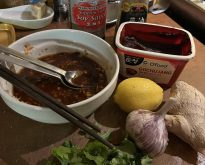It’s time for another chapter of the Singing Gardener page and more Ted Talk. When I use the word “talk” it’s as though you and I are right there, face to face, speaking to each other. In recent weeks there have been plenty of geese flying overhead in “V” formations. Some say the leader is nearly always a wise old female goose but I have no idea how that was determined. The same lady goose doesn’t necessarily lead the formation continuously, but drops back and allows a different goose to take her place. As for humans, I agree that behind every successful man is a good woman.
Read Also

Maintain motion to ease joint stiffness
As we proceed into colder, drier temperatures, it’s common to hear reports of more joint stiffness and pain, athletic therapist Kathlyn Hossack writes.
THE LATE WILF CARTER
… who was born in Nova Scotia, wrote and recorded dozens upon dozens of western songs. Many of you may perhaps remember Wilf and still have some Bluebird label 78 r.p.m. recordings of his astonishing lyrical and yodelling voice with guitar accompaniment. Wilf Carter was among Canada’s greatest singers and yodellers from an earlier era.
Among the vast repertoire of songs he wrote is a tune called: “Put Me in Your Pocket” (and I’ll go along with you). That song reminds me of all the good folks who come along with me in each issue of Grainews. If you have any thoughts about Wilf Carter, or any kind of geese, whether wild or tame; my inbox receives emails and the Canada Post mail carrier regularly drops something in my mailbox.
PACK UP YOUR TROUBLES
… in your old kit bag and smile, smile, smile. That’s the full name of a First World War song published in London in 1915. It was actually rescued from a pile of rejected songs and rescored to win a wartime competition for a marching song. It became very popular and boosted British morale despite the horrors of that war. The song is best remembered for its chorus and here are those lyrics.
Pack up your troubles in your old kit bag,
And smile, smile, smile,
While you’ve a Lucifer to light your fag,
Smile, boys, that’s the style.
What’s the use of worrying?
It never was worthwhile, so;
Pack up your troubles in your old kit bag,
And smile, smile, smile.
IN CASE YOU’RE WONDERING
A Lucifer was a popular make of match and fag became a British slang word for a cigarette. A kit bag, also known as a duffle bag, was a large, cylindrical heavy-duty canvas bag with a flat base and punched holes at the top for tying with a drawstring and was generally carried on the shoulder. The kit bag became the traditional means among both army and navy recruits for transporting personal equipment such as bedding and clothing during both world wars.
“IT’S A PITTANCE OF TIME”
… is the title of a Remembrance Day song written by Terry Kelly, a Canadian country and folk music artist. Here are a few of the lyrics.
They fought and some died for their homeland,
They fought and some died now it’s our land.
Take two minutes would you mind, it’s a pittance of time,
For the boys and the girls who went over,
In peace may they rest, may we never forget why they died,
It’s a pittance of time.
I hope you remembered to pause, acknowledge and give thanks to our own Canadian military men and women this past November 11 at 11 a.m.
THE GOOD OLD DAYS
Folks still talk about them but I hear others say that the good old days weren’t always that great. What are your thoughts in this connection? There is however, a bit of a revival from the past among homemakers who are returning to cooking with cast iron cookware. Seems nothing else can capture that down-on-the-farm home taste.
There was a time in the mid-1800s when cast iron kettles, pots and frying pans were practical, readily available and in every home. Cast iron cooking utensils absorb heat slowly and evenly and retain it for a good long while. Today, a lot of cooks are steering back to the way it once was. Often the question arises: “How do I prevent my fry pan and other cast iron utensils from rusting in spots?”
There’s a process known as curing or seasoning that can be done at home. It can be a brand new piece of cast iron cookware or an oldie handed down by Grandma that needs reconditioning. Here’s how I, Ted, cured my cast iron frying pan many seasons ago. Lightly coat and rub the inside and exterior (including the complete outside and bottom of the pan) with vegetable shortening or lard (but not vegetable oil). Place the utensil in a preheated oven at 120 C (250 F) for a couple hours. Careful upon removal… it’ll be hot. You’ll get best results if you repeat this process two or three more times.
A HANDWRITTEN LETTER
… is extra special in this age of instant communication. Many thanks to Ruby Hirch of Bow Island, Alberta for her letter that I received in October. Ruby writes: Dear Ted, When Grainews arrives in the mail I always turn to your page first. I was thrilled to see your article on “the Happy Gang.” I remember their program when I was a young girl. Now, many years later when my grandchildren come to the door I say: C’mon in, or, “is it the Happy Gang?” They laugh and go along with me. Thanks for the memories. Somewhere in my collection I have a picture of “the Happy Gang.” I do not have a computer to email you, so I do the old-fashioned thing and write letters. P.S. Thank you for the wonderful articles.
Ted’s response: I had the good fortune to speak with Ruby via telephone. She and her husband Edmund come from a farming background but have now handed the reins of responsibility over to a son who grows mostly durum wheat on about 2-1/2 sections. Edmund, 84, still has a few cattle to care for. A recent highlight for Ruby and Edmund, along with their two sons and daughter, plus their spouses and eight grandchildren was a ride “on an old diesel train” travelling from Stettler to Big Valley, Alta., under direction of The Alberta Prairie Railway Excursions. All 16 of them enjoyed a delicious turkey meal and experienced the staging of a fake train robbery. Ruby described it “as so much fun. I was so happy the entire family got together to do this little trip. It worked out so well.”
BLACKSTRAP MOLASSES
… can be a sweet cure. Here’s a neat little folk remedy for anyone who suffers from a raw or painful sore or ulcer inside the mouth; or a biting-sharp little pimple on the tip of the tongue; or a cold sore on the outside of the mouth. Several times daily, lick about a half teaspoonful of blackstrap molasses into your mouth and swish it around the tongue and over any kind of sore spot for at least 15 minutes. Then — spit it out in the garden. It’s good for the soil. Rinse out your mouth thoroughly after each use. Blackstrap contributes to quick, natural healing. Also, avoid high-acidic food, beverages and soft drinks.
MONEYBAGS
December 2013 has five Sundays, five Mondays and five Tuesdays. This rarity is called moneybags. An old folklore legend says if you share this with someone within 11 minutes after reading it, unexpected money comes your way within four days. Should you decide to follow through and try it, keep in mind it’s all for fun. There’s no guarantee extra Christmas shopping money shall arrive. But… just in case it does, let me know. †















